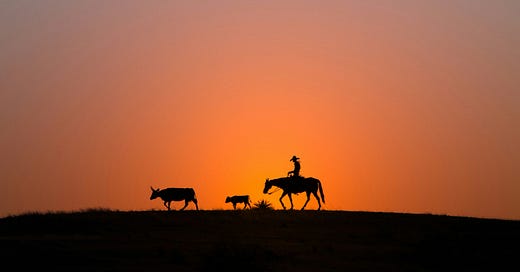Mike Blakely tells a story in his song, "The Outside Circle," of a young cowboy who aspires to be top hand on cattle roundups. The path to get there is physically demanding, requiring years of experience, and proven skills for working with horses and cattle.
The aspiring cowboy had clear models for excellence and what was required. He saw and experienced what it meant to be successful. Just as important, he saw and experienced failure. He probably also saw a good amount of good and bad luck. Such a quest gives no quarter. How and if you get there is entirely up to you and contingent on how deep your commitment goes. Credentials aren't bought, they're demonstrated and success is earned.
When working this close to the bones of Nature there's no negotiating, no manager to make decisions for you, no HR department to complain to. Mucking up a fancy roping shot is still a miss, even if the throw was pretty. An ugly backhand throw that works most of the time and gets the job done keeps your hand in and the paydays regular. Knowing every fiber of your rope and the horse you're on while reading the land you're on and the animal you're after gets you to the outside circle.
More than just time in the saddle, incremental improvements and deliberately pushing your limits with the right balance of risk and reward builds the level of competence and experience the outer circle demands. Pursuits like this are deeply personal journeys. Pretenders get hurt or worse, end up hurting others.
Blakely's Outside Circle reminds me of how the Stoics think about our ability to control the world in which we find ourselves. Characteristically divided into modern digital thinking, the Stoic approach has been described as the "dichotomy of control" - there are things about the world that we can control and things we cannot. True enough for the casual reader intent on scanning a select few quotes. But such a dichotomy implies a fatalistic view of the world and in my view it's and inaccurate reflection of the Stoic position on choice and control.
“Some things are within our power, while others are not. Within our power are opinion, motivation, desire, aversion, and, in a word, whatever is of our own doing; not within our power are our body, our property, reputation, office, and, in a word, whatever is not of our own doing.” - Epictetus
"Some things" is certainly ambiguous. Read further into the words the Stoics have left us and it becomes clear our influence and control of the world around us isn't a yes/no proposition. How we frame the world - our individual world - plays a role in what is and isn't within our power to control. Between the things over which we have complete control - how we respond to events and our judgments about the world - and the things over which we have no control - volcanoes and asteroid strikes - there are things over which we have varying levels of influence and control.
“It is not in our control to have everything turn out exactly as we want, but it is in our control to control how we respond to what happens.” - Epictetus
“We have the power to control our own lives, to determine our own happiness and success.” - Seneca
True enough, the foreman decides who rides the outside circle. But my experience has been that a boss, regardless their gender, who has also come up through the ranks and earned their leadership position would not deny advancing someone who's proven they're ready. Acting that way would be against the values they learned during their own journey toward riding the outside circle. Even so, it's important to acknowledge what kind of boss you're working for. If they lack integrity, best cut your losses and find a different brand. Even if working for a crappy boss, the cowpoke decides how much effort he's going to put into his quest. Will it be less than what other top hands have done? Just enough? Or will he press on and push the envelope, redefining what it means to be best hand? These are the choices a cowpoke makes.
Understanding how we view and respond to the challenges life throws at us is perhaps THE essential piece of self-knowledge for ultimate success in reaching our goals. I outlined several ways to develop and work with the vagaries of life in The Wind and the Sail.
I believe aspirations to excel and be the best possible version of ourselves resides within everyone. That's where I start when making assumptions about people. For the people I managed and the teams I lead, my raison d'être was to prepare the ground and make it possible for them to excel and succeed. What I learn about people from there is up to them. I usually don't have to work to hard at discerning a person's character. They reveal it themselves. All I have to do is be patient and observe. In general, my assumption is good. The exceptions are easy to spot early on.
Throughout my entire career in the corporate world, I aspired to bring the spirit of the outside circle into the office. Struggling to resolve some gnarly coding issue doesn't have to be devoid of a larger goal, a noble quest for self-improvement. Personally, I mostly succeeded. As a team lead or coach, I mostly fell short of what I believed was possible. It's impossible to create any kind of aspiration within someone else. Either they have it or they don't. If they have it, however dormant, it is possible to coax a small flame to grow. But this takes time and patience - two luxuries seldom found in the profit-driven and time-starved corporate world.
If you have any questions, need anything clarified, or have something else on your mind, please email me directly.
Photo by Glen Rushton on Unsplash




